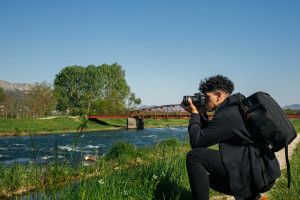In today’s world of "fake news" and widespread misinformation, reliable environmental journalism is more important than ever. The rapid spread of both accurate and misleading information through the internet and social media can create confusion about critical environmental issues such as climate change, deforestation, and pollution. Misinformation can mislead the public, skew policy decisions, and hinder progress in global sustainability efforts. As a result, environmental journalists play a vital role in cutting through the noise, fact-checking claims, and reporting the truth to raise awareness about the planet’s most pressing challenges. This course will provide you with a solid foundation in environmental journalism, starting with an introduction to its definition, historical background, and the specific duties of an environmental journalist in today’s media landscape.
The course explores the fundamental principles of ethical journalism, which are at the core of every journalist’s professional responsibility. Ethical journalism ensures that stories are reported with integrity, impartiality, and accuracy—qualities that are particularly important when covering sensitive and complex environmental issues. You will learn how to navigate ethical dilemmas that may arise when reporting on environmental topics, balancing the need for objectivity with the responsibility to advocate for truth and action in the face of environmental degradation. These principles will guide your decisions and actions as an environmental journalist, shaping how you approach storytelling, research, and reporting. Research forms the backbone of high-quality journalism, and in this course, you’ll learn how to conduct thorough research that supports credible, fact-based environmental reporting. The course places a strong emphasis on the importance of sourcing information from reliable experts, scientific studies, and environmental organizations. You will be introduced to different research methodologies that help uncover the most accurate and up-to-date information on environmental issues. This research process will enable you to construct compelling and well-founded news stories that inform the public about key environmental concerns, from endangered species and ecosystems to emerging sustainability solutions. Moreover, you’ll gain a deep understanding of story structure and how to organize the elements of a news narrative to communicate environmental issues in a way that resonates with your audience. Storytelling is essential in environmental journalism, as it transforms complex scientific data and environmental challenges into stories that engage and inspire readers. The course will provide practical techniques for crafting engaging narratives that effectively explain environmental topics and motivate action. Whether you’re covering a local issue like water pollution or a global crisis like climate change, you will learn how to tell stories that capture both the urgency and the human impact of environmental challenges.
This course is designed for a diverse range of learners, from those just starting out in environmental journalism to experienced professionals looking to sharpen their skills in this vital field. It provides a comprehensive guide to the knowledge and tools required for success. You will be introduced to the craft of writing news articles, investigative reports, and feature stories, all within the context of environmental journalism. The course will also provide insights into the specific challenges environmental journalists face, such as reporting on scientific uncertainty, dealing with complex policy debates, and addressing the global scale of many environmental issues. If you're passionate about the environment and want to use your writing and reporting skills to contribute to the global conversation on environmental protection and sustainability, this course is for you. By the end of the course, you will be equipped to take on the role of an informed, ethical environmental journalist, ready to engage with the critical issues facing our planet. You will learn to identify credible sources, build compelling narratives, and report on environmental issues with accuracy and integrity. Enroll today to begin your journey toward making a meaningful impact in the world of environmental journalism, using your unique voice to advocate for a healthier, more sustainable future.
What You Will Learn In This Free Course
View All Learning Outcomes View Less All Alison courses are free to enrol, study, and complete. To successfully complete this Certificate course and become an Alison Graduate, you need to achieve 80% or higher in each course assessment.
Once you have completed this Certificate course, you have the option to acquire an official Certificate, which is a great way to share your achievement with the world.
Your Alison certificate is:
- Ideal for sharing with potential employers.
- Great for your CV, professional social media profiles, and job applications.
- An indication of your commitment to continuously learn, upskill, and achieve high results.
- An incentive for you to continue empowering yourself through lifelong learning.
Alison offers 2 types of Certificate for completed Certificate courses:
- Digital Certificate: a downloadable Certificate in PDF format immediately available to you when you complete your purchase.
- Physical Certificate: a physical version of your officially branded and security-marked Certificate
All Certificate are available to purchase through the Alison Shop. For more information on purchasing Alison Certificate, please visit our FAQs. If you decide not to purchase your Alison Certificate, you can still demonstrate your achievement by sharing your Learner Record or Learner Achievement Verification, both of which are accessible from your Account Settings.












 Avg. Hours
Avg. Hours  Contains Video
Contains Video  CPD Accredited
CPD Accredited 
 Total XP:
Total XP: 
 Knowledge & Skills You Will Learn
Knowledge & Skills You Will Learn 







